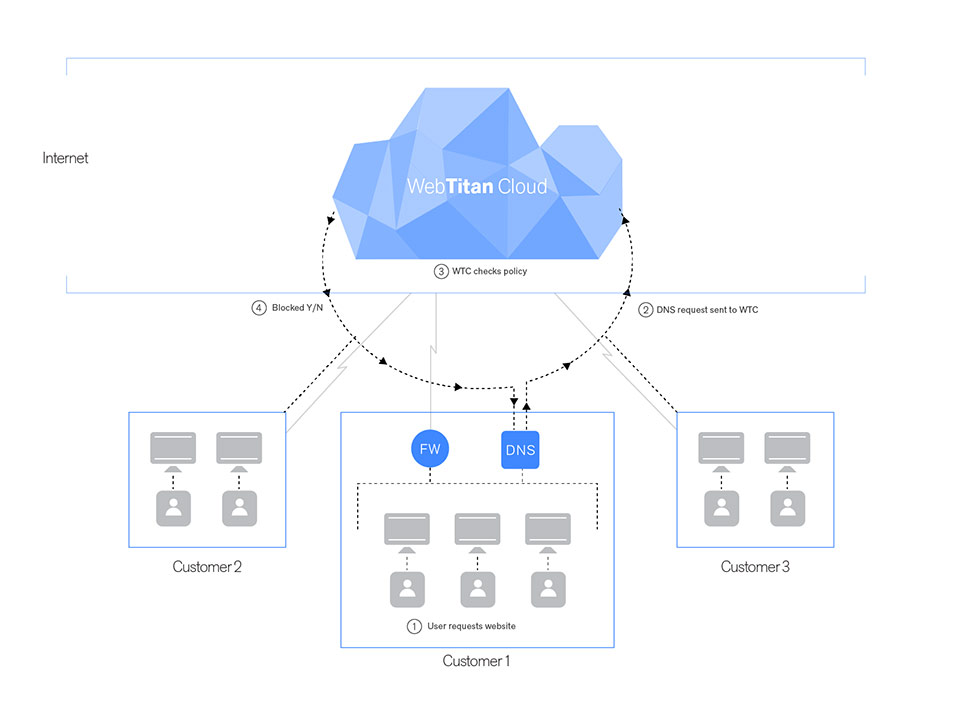There are many different types of Internet content filtering solutions available on the market, so the purpose of explaining how to filter Internet content is to give organizations an insight into how Internet content filters work. This should provide organizations with the information they need to make an informed decision about which solution is most suitable.
Internet content filters are essential tools for organizations concerned about their cybersecurity. They can prevent Internet users from visiting webpages that harbor malware and computer viruses, help thwart email phishing campaigns and, when used as an Internet access control solution, block access to productivity-draining online activities in the workplace.
How Internet Content Filters Work
Most Internet content filters have a three-tier mechanism to block access to unsafe, inappropriate and productivity-draining websites. When an Internet user makes a request to visit a website - either by typing in its URL or by clicking on a link - the filter checks the request against its parameters to determine whether the request should be allowed or denied.
- The first tier of the mechanism to filter Internet content is a blacklist. This is a list of all websites known to harbor malware, to have exploited vulnerabilities or to hide their true identity behind a proxy server. Blacklists are usually updated in real time by the filtering service provider.
- The second tier of the mechanism to filter Internet content contains category filters. System administrators select which categories to block access to via a browser-based administration panel. Categories typically selected include gambling, social media and online shopping.
- The third tier of the mechanism to filter Internet content contains keyword filters. Again system administrators have the choice of which keywords to block in order to fine tune their category filters. It is also possible to block the download of specific file types using keyword filters.
Between them, these three tiers provide an adequate level of filtering to suit most organizations´ requirements. The settings can be applied by user-group for increased flexibility, and applied by time if - for example - an organization wants to restrict personal use of the Internet during working hours, but is happy to relax the controls during lunch breaks and after work.
Did You Know?
businesses experienced a DNS attack
malware & spyware domains categorised a day
predefined categories by default
of websites tested by Google for malware were infected
How Mechanisms to Restrict Internet Access Work
An Internet site blocker uses a three-tiered filtering process in order to maximize protection against online threats and provide the necessary flexibility to restrict Internet access effectively. Mechanisms to restrict Internet access that are inflexible are unlikely to be effective in achieving the company´s aims.
The first tier checks each requests to visit a URL against blacklists of websites known to harbor malware and known to have been constructed for phishing attacks. The filters in this tier are automatically updated as new threats are identified to reduce the maintenance overhead for system administrators.
In the second tier, millions of the world´s most visited websites are sorted into categories according to their subject matter (abortion, adult entertainment, alcohol, etc.). System administrators can choose which categories they want to restrict Internet access to with the click of a mouse.
The third tier is used to fine-tune the category filters by allowing system administrators to block Internet access to websites containing specific keywords or phrases. This tier can also be used to prevent users downloading files with the extensions most often associated with malware (.exe, .rar, .scr, etc.).
Further flexibility is provided by the option to apply the category and keyword filters universally, by user group or by individual user. The filtering parameters can also be applied by time or bandwidth, while trusted websites can be excluded from the filtering process by using the whitelisting facility.
TitanHQs Solutions to Restrict Internet Access
TitanHQs solutions to restrict Internet access is called WebTitan. The WebTitan solution has been designed with ease of use at the forefront of development, as any Internet site blocker that is too complicated to use will be ineffective in achieving the company´s aims no matter how flexible it is.
WebTitan Cloud
WebTitan Cloud offers the same ease-of-use and flexibility as WebTitan Gateway but, instead of the filtering process taking place onsite, it takes place in the cloud. This has the advantage of releasing resources on companies´ CPUs for other operations. WebTitan Cloud can be deployed within minutes with a simple redirection of the DNS server settings.
WebTitan Cloud for WiFi
WebTitan Cloud for WiFi has been specifically designed for companies with BYOD policies or who provide a WiFi service to the public. WebTitan Cloud for WiFi is compatible with all types of wireless network - regardless of whether they operate via a single router or a network of WiFi hotspots - and has the advantage of protecting networks when users connect to them with malware-infected devices.
Try a WebTitan Internet Site Blocker for Free
If you are concerned about the increasing number of worldwide cyberattacks, and would like to protect your network against online threats, we invite you to contact us and request a free trial of the WebTitan Internet site blocker that is most appropriate for your situation.
Our team of experienced and friendly Sales Technicians will be happy to offer their advice about the most appropriate solution to restrict Internet access, answer any questions, you have and guide you through the process of registering for your free trial and deploying the best Internet site blocker.
One is never able to predict when a cyberattack is about to begin. So, do not delay in protecting your network with an Internet site blocker from TitanHQ, and experience the positive benefits of improving workplace productivity and preventing users being exposed to offensive online material.

"Keeps us from getting compromised with something that will impact the day-to-day business."
The Different Architectures Used to Filter Internet Content
The term “architectures” refers to the different types of ways in which it is possible to filter Internet content. There are basically four different architectures - client-based, server-based, gateway-based and cloud-based.
Client-based Internet content filters can be hardware or software filters that are installed on individual devices. They are popular because of their low initial costs, but have a high maintenance overhead in as much as each filter has to be configured, updated and managed separately.
Server-based Internet content filters control access to the Internet for everybody receiving their web service through the same server. Although easier to manage than individual devices, they require hardware purchases and on premise installation of the software.
Gateway-based Internet content filters are software applications that are installed behind an organization´s firewall. Generally enterprise grade tools, these solutions are favored by larger organizations looking to avoid significant hardware costs.
Cloud-based Internet content filters use neither hardware nor software. Cloud-based solutions filter Internet content via an on-site service that can be accessed with a simple adjustment of the organization´s DNS. These solutions are universally compatible and infinitely scalable, so suitable for all sizes of organization.
TitanHQ´s Suite of Internet Content Filtering Solutions
Since 1999, TitanHQ has been developing online security solutions for organizations all over the world. Our suite of Internet content filtering solutions has been developed to make deployment and administration as straightforward and cost-effective as possible. We have found the following gateway-based and cloud-based solutions suitable for the majority of our clients:
WebTitan Cloud
WebTitan Cloud is a low-maintenance solution to filter Internet content that can be implemented within minutes without having to download software.
WebTitan Cloud for WiFi
WebTitan Cloud for WiFi provides a high level of protection Wi-Fi networks and the devices that connect to them with imperceptible latency.
Each of our solutions have highly granular controls for setting filtering parameters. There are no restrictions on the amount of bandwidth used or the number of users connected to the filter, and APIs are available to integrate the filtering solutions with existing backend management tools. Each solution also has a range of customizable reporting options to assist the enforcement of acceptable use policies.
Try the WebTitan Product of Your Choice for Free
Our trial offer includes a fully-enabled WebTitan filter, full technical support, and all the help you could need from our customer support team. There are no contracts to sign, no credit card required, and no obligation to continue with the service once the trial period has ended.
To discuss which might be the most suitable solution for your free trial, contact our team of sales technicians. Our team will offer advice about which product within the WebTitan range would be applicable in your circumstances, and walk you through the registration process to start your free trial. Within minutes you could be experiencing how to filter Internet content to help protect your users from malware and other web-borne threats.

Susan Morrow
- DNS FILTERING
- WEB FILTERING
- CONTENT FILTERING
Talk to our Team today


